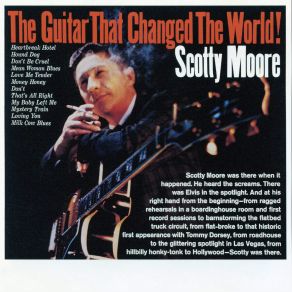The Guitar That Changed the World!
Download links and information about The Guitar That Changed the World! by Scotty Moore. This album was released in 1964 and it belongs to Rock, Rock & Roll, Rockabilly, Pop genres. It contains 12 tracks with total duration of 28:07 minutes.

|
|
|---|---|
| Artist: | Scotty Moore |
| Release date: | 1964 |
| Genre: | Rock, Rock & Roll, Rockabilly, Pop |
| Tracks: | 12 |
| Duration: | 28:07 |
| Buy it NOW at: | |
| Buy on iTunes $9.99 | |
Tracks
[Edit]| No. | Title | Length |
|---|---|---|
| 1. | Hound Dog | 2:09 |
| 2. | Loving You | 2:29 |
| 3. | Money Honey | 2:07 |
| 4. | My Baby Left Me | 2:16 |
| 5. | Heartbreak Hotel | 2:40 |
| 6. | That's All Right | 2:18 |
| 7. | Milk Cow Blues | 2:23 |
| 8. | Don't | 2:43 |
| 9. | Mystery Train | 1:59 |
| 10. | Don't Be Cruel | 2:03 |
| 11. | Love Me Tender | 2:45 |
| 12. | Mean Woman Blues | 2:15 |
Details
[Edit]Scotty Moore's guitar, as represented on Elvis Presley's Sun sides in 1954 and 1955, did help in a big way to change the world. But 1964 was definitely not the year in which for Moore or Epic Records to try and remind anyone that fact, even with Elvis alumni D.J. Fontana (drums), Bob Moore (bass), Boots Randolph (sax), Jerry Kennedy (guitar), Buddy Harman (drums), Bill Pursell (piano), and the Jordanaires aboard. The Guitar That Changed the World passed largely without notice that year, becoming a curiously mistimed attempt at a career move. Apart from its sense of timing, the album's problems included having more of a Nashville than a Memphis sound, being a little too mid-tempo and relaxed, and having too much sax and country piano. Without Elvis' presence, there wasn't going to be an overabundance of sexuality, nothing like the excitement of the originals, in these re-recordings of "That's All Right," "Hound Dog," "Money Honey," "Heartbreak Hotel," "Milk Cow Blues," "Mystery Train," and so on, but the country sound here is a little too pale, and a little too close in spirit to Chet Atkins. Rather than trying to pick up where he'd left off at Sun in 1955, or even recreating the pseudo-Sun sound of Elvis' early RCA singles, Moore aimed for more of a mature, virtuoso performance — he plays beautifully and dexterously, but not with much excitement or any attempt to elicit excitement from the listener; he and the rest concentrate more on precision, and the resulting album is strong there and weak in most other departments. It's beautifully, carefully played but nothing like spontaneous, cutting-edge rock & roll. Guitar buffs and Elvis completists will want this, but others should hear it also, if only to get a glimpse of what Elvis' sidemen (and collaborators, in Moore's case) could do on their own.